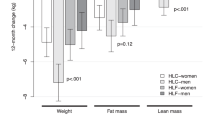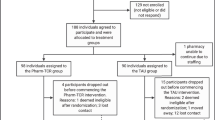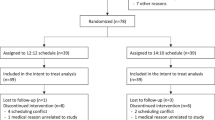Abstract
Background/objectives
Lipopolysaccharide-binding protein (LBP), a biomarker of gut barrier permeability to lipopolysaccharides, is higher in adults with obesity and type 2 diabetes. Behavioral weight loss and metformin have distinct effects on the gut microbiome, but their impact on gut permeability to lipopolysaccharides is unknown. This study’s objective was to determine the effects of a behavioral weight-loss intervention or metformin treatment on plasma LBP.
Subjects/methods
SPIRIT was a randomized trial of adults with overweight or obesity. Participants were randomized to one of three arms: metformin treatment, coach-directed behavioral weight loss on a DASH diet, or self-directed care (control). Of 121 participants, a random subset (n = 88) was selected to have LBP measured at baseline, 6 months, and 12 months post intervention. Intervention effects on LBP over time were assessed using generalized estimating equations (GEE). We also examined whether the intervention effects were modified by change in diet and weight.
Results
Arms were balanced by sex (83% female), race (51% white), and age (mean 60 years), with no differences in baseline LBP (median 4.23 μg/mL). At 1 year, mean weight change was −3.00% in the metformin arm, −3.02% in the coach-directed behavioral weight-loss arm, and +0.33% in the self-directed (control) arm. The corresponding change in LBP was +1.03, −0.98, +1.03 μg/mL. The behavioral weight-loss intervention reduced LBP compared to self-directed care (β = −0.17, 95% CI: −0.33 to −0.01); no other between-arm comparisons were significant. Behavioral weight-loss participants who reduced dietary fat showed the greatest reductions in 6-month LBP (β = −2.84, 95% CI: −5.17 to −0.50).
Conclusions
Despite similar weight loss in the behavioral weight loss arm and the metformin arm, only the behavioral weight-loss intervention reduced LBP compared to control. Lifestyle weight-loss interventions that promote a DASH diet may be effective at reducing gut barrier permeability to lipopolysaccharides.
Clinical trials registration number
NCT02431676, https://clinicaltrials.gov
This is a preview of subscription content, access via your institution
Access options
Subscribe to this journal
Receive 12 print issues and online access
$259.00 per year
only $21.58 per issue
Buy this article
- Purchase on Springer Link
- Instant access to full article PDF
Prices may be subject to local taxes which are calculated during checkout


Similar content being viewed by others
Data availability
Data described in the manuscript, code book, and analytic code will be made available upon reasonable request.
References
Van Amersfoort ES, Van Berkel TJ, Kuiper J. Receptors, mediators, and mechanisms involved in bacterial sepsis and septic shock. Clin Microbiol Rev. 2003;16:379–414.
Cani PD, Amar J, Iglesias MA, Poggi M, Knauf C, Bastelica D, et al. Metabolic endotoxemia initiates obesity and insulin resistance. Diabetes. 2007;56:1761–72.
Grube BJ, Cochane CG, Ye RD, Green CE, McPhail ME, Ulevitch RJ, et al. Lipopolysaccharide binding protein expression in primary human hepatocytes and HepG2 hepatoma cells. J Biol Chem. 1994;269:8477–82.
Wurfel MM, Monks BG, Ingalls RR, Dedrick RL, Delude R, Zhou D, et al. Targeted deletion of the lipopolysaccharide (LPS)-binding protein gene leads to profound suppression of LPS responses ex vivo, whereas in vivo responses remain intact. J Exp Med. 1997;186:2051–6.
Novitsky TJ. Limitations of the Limulus amebocyte lysate test in demonstrating circulating lipopolysaccharides. Ann N. Y. Acad Sci. 1998;851:416–21.
Ruiz AG, Casafont F, Crespo J, Cayón A, Mayorga M, Estebanez A, et al. Lipopolysaccharide-binding protein plasma levels and liver TNF-alpha gene expression in obese patients: evidence for the potential role of endotoxin in the pathogenesis of non-alcoholic steatohepatitis. Obes Surg. 2007;17:1374–80.
Lepper PM, Schumann C, Triantafilou K, Rasche FM, Schuster T, Frank H, et al. Association of lipopolysaccharide-binding protein and coronary artery disease in men. J Am Coll Cardiol. 2007;50:25–31.
Moreno-Navarrete JM, Ortega F, Serino M, Luche E, Waget A, Pardo G, et al. Circulating lipopolysaccharide-binding protein (LBP) as a marker of obesity-related insulin resistance. Int J Obes. 2012;36:1442–9.
Liu X, Lu L, Yao P, Ma Y, Wang F, Jin Q, et al. Lipopolysaccharide binding protein, obesity status and incidence of metabolic syndrome: a prospective study among middle-aged and older Chinese. Diabetologia. 2014;57:1834–41.
Gonzalez-Quintela A, Alonso M, Campos J, Vizcaino L, Loidi L, Gude F. Determinants of serum concentrations of lipopolysaccharide-binding protein (LBP) in the adult population: the role of obesity. PloS One. 2013;8:e54600.
Salden BN, Troost FJ, Wilms E, Truchado P, Vilchez-Vargas R, Pieper DH, et al. Reinforcement of intestinal epithelial barrier by arabinoxylans in overweight and obese subjects: A randomized controlled trial: Arabinoxylans in gut barrier. Clin Nutr. 2018;37:471–80.
González-Sarrías A, Romo-Vaquero M, García-Villalba R, Cortés-Martín A, Selma MV, Espín JC. The Endotoxemia Marker Lipopolysaccharide-Binding Protein is Reduced in Overweight-Obese Subjects Consuming Pomegranate Extract by Modulating the Gut Microbiota: A Randomized Clinical Trial. Mol Nutr Food Res. 2018;62:e1800160.
Damms-Machado A, Louis S, Schnitzer A, Volynets V, Rings A, Basrai M, et al. Gut permeability is related to body weight, fatty liver disease, and insulin resistance in obese individuals undergoing weight reduction. Am J Clin Nutr. 2017;105:127–35.
Ott B, Skurk T, Hastreiter L, Lagkouvardos I, Fischer S, Büttner J, et al. Effect of caloric restriction on gut permeability, inflammation markers, and fecal microbiota in obese women. Sci Rep. 2017;7:11955.
van Dielen FM, Buurman WA, Hadfoune M, Nijhuis J, Greve JW. Macrophage inhibitory factor, plasminogen activator inhibitor-1, other acute phase proteins, and inflammatory mediators normalize as a result of weight loss in morbidly obese subjects treated with gastric restrictive surgery. J Clin Endocrinol Metab. 2004;89:4062–8.
Yang PJ, Lee WJ, Tseng PH, Lee PH, Lin MT, Yang WS. Bariatric surgery decreased the serum level of an endotoxin-associated marker: lipopolysaccharide-binding protein. Surgery for obesity and related diseases: official journal of the American Society for Bariatric. Surgery. 2014;10:1182–7.
Clemente-Postigo M, Roca-Rodriguez Mdel M, Camargo A, Ocaña-Wilhelmi L, Cardona F, Tinahones FJ. Lipopolysaccharide and lipopolysaccharide-binding protein levels and their relationship to early metabolic improvement after bariatric surgery. Surg Obes Related Dis. 2015;11:933–9.
Yerevanian A, Soukas AA. Metformin: Mechanisms in Human Obesity and Weight Loss. Curr Obes Rep. 2019;8:156–64.
Fujimoto WY, Jablonski KA, Bray GA, Kriska A, Barrett-Connor E, Haffner S, et al. Body size and shape changes and the risk of diabetes in the diabetes prevention program. Diabetes. 2007;56:1680–5.
Marti A, Martínez I, Ojeda-Rodríguez A, Azcona-Sanjulian MC. Higher Lipopolysaccharide Binding Protein and Chemerin Concentrations Were Associated with Metabolic Syndrome Features in Pediatric Subjects with Abdominal Obesity during a Lifestyle Intervention. Nutrients. 2021;13:289.
Yeh HC, Maruthur NM, Wang NY, Jerome GJ, Dalcin AT, Tseng E, et al. Effects of behavioral weight loss and metformin on insulin-like growth factors in cancer survivors: a randomized trial. J Clin Endocrinol Metab. 2021;106:e4179–91.
Appel LJ, Clark JM, Yeh H-C, Wang N-Y, Coughlin JW, Daumit G, et al. Comparative effectiveness of weight-loss interventions in clinical practice. N, Engl J Med. 2011;365:1959–68.
Irimata K, Wakim P, Li X. Estimation of correlation coefficient in data with repeated measures. Proceedings of the SAS Global Forum 2018. Cary, NC: SAS Institute Inc; 2018.
Wickham H. ggplot2: Elegant Graphics for Data Analysis. New York: Springer-Verlag; 2016.
R Core Team. R: A Language and Environment for Statistical Computing. Vienna, Austria: R Foundation for Statistical Computing; 2020.
Moreno-Navarrete JM, Escoté X, Ortega F, Serino M, Campbell M, Michalski M-C, et al. A role for adipocyte-derived lipopolysaccharide-binding protein in inflammation- and obesity-associated adipose tissue dysfunction. Diabetologia. 2013;56:2524–37.
Mueller NT, Differding MK, Zhang M, Maruthur NM, Juraschek SP, Miller ER, 3rd, et al. Metformin Affects Gut Microbiome Composition and Function and Circulating Short-Chain Fatty Acids: A Randomized Trial. Diabetes Care. 2021;44:1462–71.
Wu H, Esteve E, Tremaroli V, Khan MT, Caesar R, Mannerås-Holm L, et al. Metformin alters the gut microbiome of individuals with treatment-naive type 2 diabetes, contributing to the therapeutic effects of the drug. Nature Med. 2017;23:850–8.
Forslund K, Hildebrand F, Nielsen T, Falony G, Le Chatelier E, Sunagawa S, et al. Disentangling type 2 diabetes and metformin treatment signatures in the human gut microbiota. Nature. 2015;528:262–6.
Choi J, Joseph L, Pilote L. Obesity and C-reactive protein in various populations: a systematic review and meta-analysis. Obes Rev. 2013;14:232–44.
Han MS, White A, Perry RJ, Camporez J-P, Hidalgo J, Shulman GI, et al. Regulation of adipose tissue inflammation by interleukin 6. Proc Natl Acad Sci. 2020;117:2751.
Scheller J, Chalaris A, Schmidt-Arras D, Rose-John S. The pro- and anti-inflammatory properties of the cytokine interleukin-6. Biochim et Biophys Acta. 2011;1813:878–88.
Sonis ST. The pathobiology of mucositis. Nature Rev Cancer. 2004;4:277–84.
Funding
The SPIRIT study was funded by the Maryland Cigarette Restitution Fund. NTM was supported by the National Heart, Lung, and Blood Institute of the National Institutes of Health (K01HL141589). HCY was supported in part by the National Cancer Institute’s Cancer Centers Support Grant to the Sidney Kimmel Comprehensive Cancer Center at Johns Hopkins (5P30CA006973). CT was supported by the National Heart, Lung, and Blood Institute grant T32HL007024.
Author information
Authors and Affiliations
Contributions
Contributions (in alphabetical order): designed research: HCY, NTM. Conducted research: HCY, LJA, NTM. Performed statistical analysis: CT, NTM. Wrote paper: CT, NTM. Other—data interpretation and manuscript revision: CT, ERM, HCY, LJA, NM, NTM, SPJ.
Corresponding author
Ethics declarations
Competing interests
The authors declare no competing interests.
Additional information
Publisher’s note Springer Nature remains neutral with regard to jurisdictional claims in published maps and institutional affiliations.
Supplementary information
Rights and permissions
About this article
Cite this article
Tilves, C., Yeh, HC., Maruthur, N. et al. A behavioral weight-loss intervention, but not metformin, decreases a marker of gut barrier permeability: results from the SPIRIT randomized trial. Int J Obes 46, 655–660 (2022). https://doi.org/10.1038/s41366-021-01039-2
Received:
Revised:
Accepted:
Published:
Issue Date:
DOI: https://doi.org/10.1038/s41366-021-01039-2
This article is cited by
-
Metformin and cancer hallmarks: shedding new lights on therapeutic repurposing
Journal of Translational Medicine (2023)



